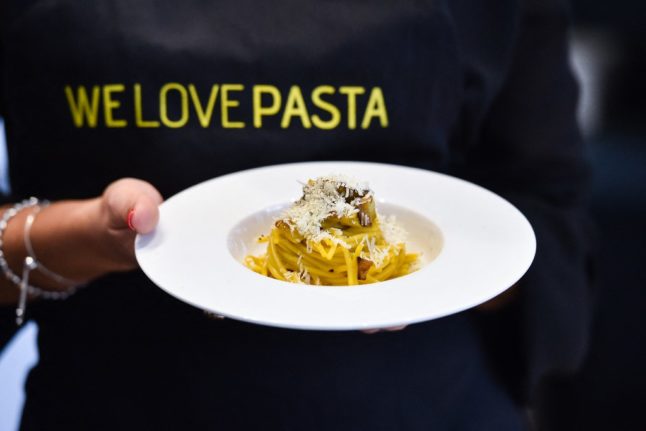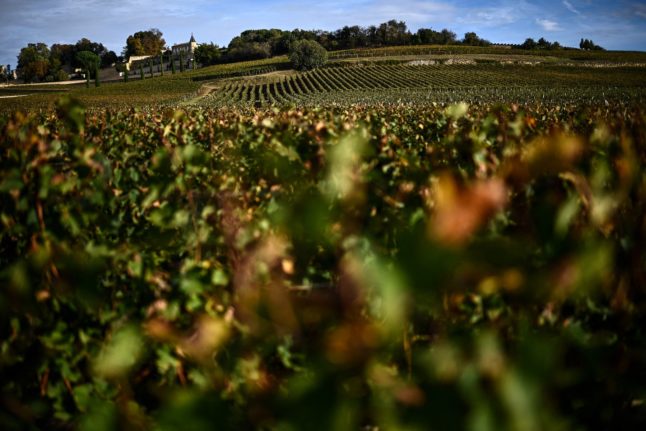When it comes to defending their iconic recipes Italians really are extremely touchy, and at times lash out with verbal aggressiveness as if they’ve been dealt a heavy blow.
Food outrage is standard whenever a popular foreign chef or media outlet messes with classic recipes, creating ‘Frankenstein’ dishes that make Italians’ hair stand on end.
READ ALSO: ‘Declaration of war’: Outrage in Italy over New York Times tomato carbonara
The tomato carbonara recipe with parmesan and bacon recently published by the New York Times is just the latest example of such a ‘monster’ twist.
In recent years Italian food lobbies have taken up arms against such culinary contaminations, which they deem preposterous – from pizza with pineapple to caprese salad with cheddar cheese instead of buffalo milk mozzarella.
Farmers group Coldiretti says recipes like tomato carbonara destroy or “betray” traditional Made-in-Italy goods.
italians reaction to your carbonara twist: pic.twitter.com/Z8b9cin1BX
— italians mad at food (@ItalianComments) August 1, 2022
But why so much ado, and why are Italians known as being the most fussy about this?
Italians are the most emotional about their food when compared to other nationalities. Italian cuisine is viewed much like a flag, a source of pride. Truth be told (and not just because I’m Italian) this is because Italian cuisine is the most rich, diverse and complete in the world. It’s unmatched.
So I believe Italians’ reputation for being food zealots is unfair. Their outrage at off-the-wall reinterpretations of traditional dishes is justified.
However, try messing with French baguettes and see what happens; the French are also very nationalist about food – albeit not as much as Italians.
READ ALSO: 34 sure-fire ways to truly offend an Italian
You might think Italians get so angry about people messing with their recipes because they believe their food is simply perfect, and therefore untouchable. But it’s not a matter of perfection, which would be an arrogant reason.
I believe the main issue is in messing with a centuries-old gastronomic culture handed down across generations with few changes. Take lasagne: its ancestor is the laganae on which the Ancient Romans feasted. Delicious thin sheets of layered pasta to which the great Cicero was addicted and ate so many plates of it he ended up with an upset stomach for the rest of his life.
Contaminating food tradition is like destroying Nonna’s much-loved recipes and the food handed down to us by our ancestors. Food is culture and identity, just like language, art, history and music. So if someone messes with Italian food they’re actually messing with Italian identity.
This identity is far from being perfect, but it’s unique in its kind, multifarious and dates back millennia.
MORE OPINION:
- Michelin-starred cuisine is just not suited to Italy
- Kiwi pizza and mozzarella sushi – why Italian food ‘innovation’ needs to stop
- Want to eat well in Italy? Here’s why you should ditch the cities
There is a distinction worth making: if it’s foreigners or outsiders contaminating our dishes with wacky takes and ingredients, it’s a no-no and hell comes down. But if an Italian provocateur chef or avant-garde restaurant creates an experimental twist, it’s okay. It might raise a few eyebrows, but there is seldom any shock or outrage.
That’s because, as long as an Italian messes with his own ‘domestic food’ it’s still within the limits of what may be morally acceptable, but if a foreign entity does so that’s perceived as an invasion, a violation of national identity – like trespassing a boundary.
I’ve had the chance to taste dishes at certain fancy Italian restaurants – not necessarily Michelin-starred – including a premium Piedmont beef fillet with melted chocolate and sbriciolata crushed biscuits on it, Roman porcini with oranges, fettuccine with blueberry sauce, even lasagne turned into a paste and squeezed into a tube, and tiramisu espresso made from a coffee machine.
At Christmas many pastry chefs around Italy compete in creating crazy twists to Milan’s traditional panettone cake by adding olives, aubergines, vinegar, foie gras and chili pepper. It’s so trendy that even a yearly event has been organized to admire their takes and Italians are intrigued by these salty panettone variants.
So it all comes down to one of my granny’s wise sayings about her husband (which here would be Italian cuisine): Guai a chi me lo tocca, solo io posso punirlo e trattarlo male, meaning ‘nobody can touch him, I’m the only one who can punish and treat him badly’.
Bottom line: as long as it’s an ‘in-house’ overturning of iconic recipes it’s fair game. If it comes from abroad: ‘giù le mani’, don’t touch… my carbonara, for instance.



 Please whitelist us to continue reading.
Please whitelist us to continue reading.
I lived an Italy for 30 years and became just as fussy as everyone else about food orthodoxy. When I returned to the USA I once went to an Italian restaurant and ordered a classic Cozze dish, or so I thought. My American sister-in-law was with me when the plate arrived smothered in cheese. I threw a tantrum about cheese being verboten on any fish, and how could this place claim to be Italian?! She was flabbergasted. Her rebuttal to my protestations was, and I quote,” you, my dear, need a good lay”!